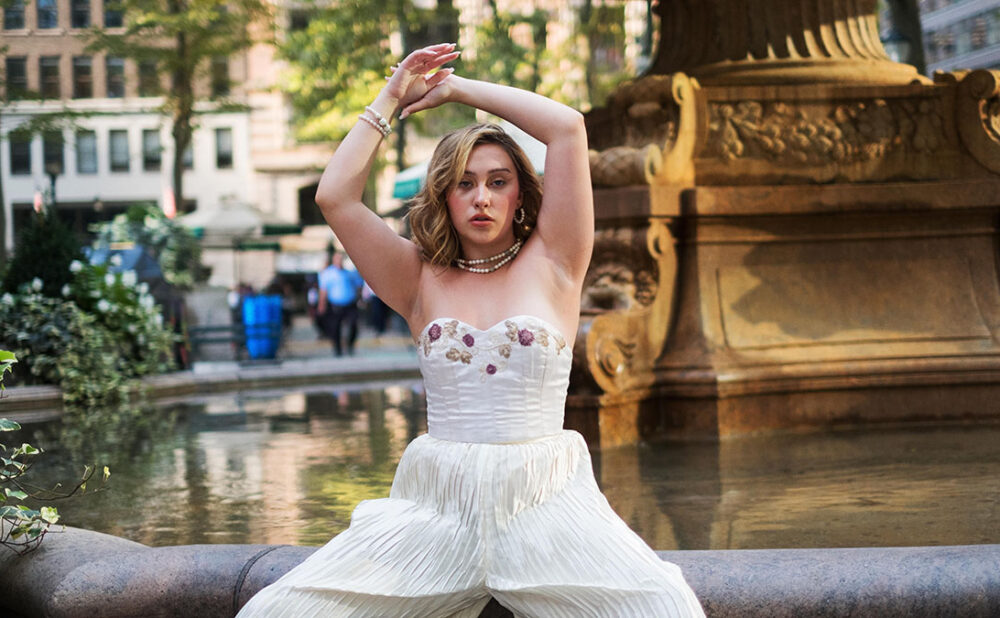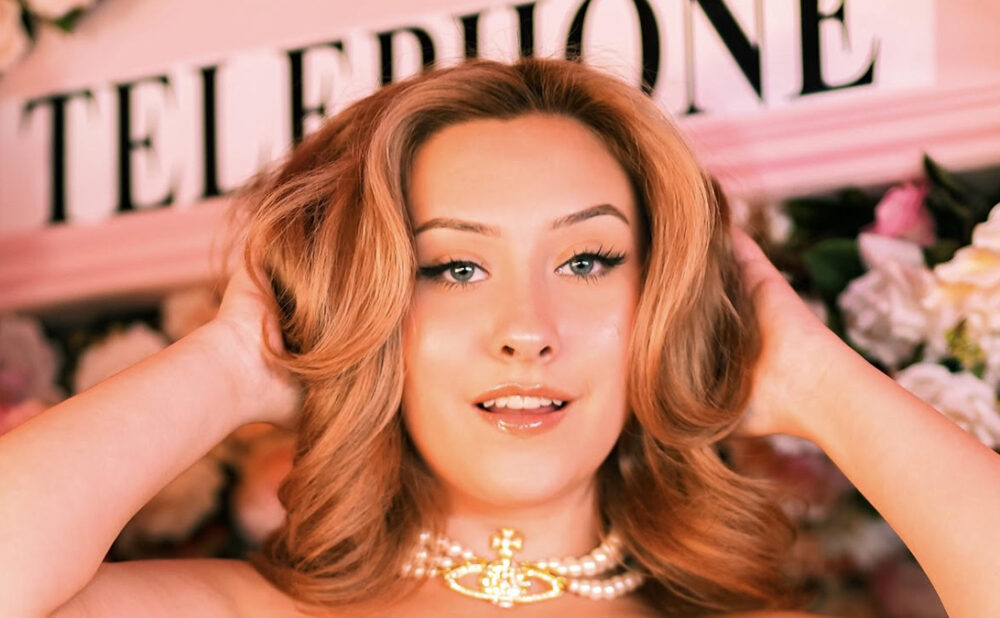Brooklynne Webb is in control
The TikTok star, known to her 10 million followers as xobrooklynne, has spent the last month as the internet’s punching bag. That’s just how she planned it.
Brooklynne Webb, the bubbly 17-year-old TikTok star known to the internet by her username xobrooklynne, has spent the last month as the butt of an app-wide joke.
Her debut single, My Crown, is a laughingstock.
With an audience of millions, she’s currently facing more mockery and derision every day than most people experience in their whole lives. Despite her kind online persona and enduringly positive message, reading her noxious comment section is a crash course in violent misogyny. Commenters call her cringey, overhyped, stupid, and annoying, among countless other remarkably cruel barbs I can’t print here. It would seem like her online life has spiralled out of her control, but don’t worry — for Webb, everything is going according to plan.
Webb, who hails from British Columbia, rose to internet mega-fame over quarantine when she started replying to hate comments about her weight by unabashedly celebrating her body type. Her videos typically focus on girly fashion, princess roleplays, and radical positivity, and she’s amassed almost 10 million followers since March 2020. Her content is aimed mainly at young girls.
Unlike many young stars of her ilk, she’s never said a slur or had a legitimate scandal, and other major influencers I spoke to say she’s one of the “kindest, sweetest” people they’ve ever met. But if you take a look through her comments section, you wouldn’t know it — because as of right now, Webb is one of the most hated women on the internet.
Scroll through the replies to any video on her page, and you’ll see tens of thousands of comments all echoing the same sentiment; to her legion of haters, Webb is nothing more than a cringe-content farm with misplaced confidence who desperately needs to be “humbled.”
“They think I’m a cringy girl boss millennial, even though I’m 17,” she says as we chat over Zoom. “They think I’m dumb, too. Everyone thinks I’m dumb.”
The recent onslaught of hate was instigated by the release of Webb’s debut single, which has turned her into a universal meme. She’d been teasing a music career for weeks through off-key singing videos that went massively viral thanks to an audience hungry to laugh at her expense, and when the track finally released, its cringe-worthy lyrics and heavy autotune propelled it to a level of instant infamy rivalled only by Rebecca Black’s Friday. The song, which features lines like “Baby, baby, I’m no damsel/I’m just too hot to handle/POV: you’re trying really hard to get me cancelled” and “I’m just doing me, and you look freaking crazy,” was used in tens of thousands of videos and amassed tens of millions of views within days. At the same time, Webb began to receive the most vitriolic, violent hate she’d ever faced in her career. By all appearances, she was living every creator’s worst fear: She had become the butt of a cultural joke.
@xobrooklynneIn case you missed it… MY CROWN MUSIC VIDEO OUT NOW !!♬ My Crown – XoBrooklynne
When I reached out to Webb through DM, asking for an interview shortly after the release of her song, I didn’t expect a reply. When she said yes, I was pleasantly surprised. I’d always had a feeling that there was more to xobrooklynne than met the eye, but going into our chat, I wasn’t planning to write anything more than a piece about a kind, well-meaning girl who wrote a cute song and got caught up in a firestorm of hatred beyond her control. Instead, Webb shocks me even further: Five minutes into our conversation, she gives me exclusive access to the story of how she got millions of people to believe an elaborate satire that’s been nine months in the making.
Her music career is fake. She describes all her recent posts are “performance art.” Her heavily-hyped upcoming album is a ruse (in an act of incredible comedic foresight, Webb has filled her “album” entirely with ironic remixes of her universally reviled song).
“Everything I do is very deliberate,” Webb says. “I’ve been able to survive on this app because I know how people are going to react.” In short, Webb’s audience has spent a year thinking that they’re in control. In reality, she’s been pulling their strings the whole time.
Here is a universal truth: the internet is reliably, unwaveringly terrible to women. Webb has been familiar with this reality for a long time — she’s been living it since long before the release or conception of My Crown.
“I definitely feel like I’ve been held to a different standard,” she says. “Maybe it’s just because I’ve always been outspoken about the way that I feel, and people know that they can get a reaction out of me. Or maybe it’s literally just because I’m a 17-year-old girl.”
She’d always received hate, of course — the most harmful of which she says came from Twitter’s eating disorder communities, who frequently used her body as ‘motivation’ to starve themselves — but until sometime around January 2021, Webb held a starkly different position in the cultural consciousness. For a while, I felt as though she was something of an underdog to the denizens of TikTok. She regularly received millions of likes on her videos standing up to body-shamers. But around a year ago, she noticed a major shift.
“It all switched right when I started to be more outspoken about rights for people other than just myself, instead of just posting like, “Oh, here’s my cute body positivity content.” When I actually started to be more outspoken about the issues, that’s definitely when I noticed a little split. And then especially when I got cancelled, back in January … at that point, people were looking for a reason to hate me.”
The cancellation she’s talking about was another topic I was eager to bring up.
“I can tell you exactly what happened,” she laughs when I press for details. “I haven’t put the story fully online because I knew people would take it and spin it.”
Earlier this year, Webb was accused through a series of leaked screenshots of telling someone to kill themselves over what was spun as a “difference of opinion.” Almost nothing about that story was true, but for an app full of people who’d been waiting with bated breath for the seemingly perfect TikTok princess to slip up, it became a death sentence.
The real story is starkly different than the version that spread online.
“When I was 16, I was added to this group chat full of older people because my friend got added to it, and they added a bunch of their friends because they were being attacked for being queer,” Webb explains.
“[The people in the group chat] were saying things like “gays should be gassed like Jewish people,” they were sending videos of white people saying the N-word, just like — just the most disgusting, horrible things. I guess I could have left in that scenario … I could have picked a lot of other choice words. But I got mad. And people took screenshots. And, if you look at the screenshots … I didn’t actually even wish death upon them.”
It seems obvious to me that Webb did nothing wrong here, especially not when compared to the countless influencers her age who have been exposed for actually being racists. The fact that this righteous interaction spiralled into months of nonstop, violent hatred is a remarkable injustice, and it revealed to Webb a deeper truth about how her audience perceived her.
“I turned off my whole phone when that happened,” she says, quietly. “I deleted all social media for two days at least. I literally just laid in bed all day, didn’t eat and slept for multiple days straight.
“I think that people forget creators are human beings and can have human reactions to things.” She pauses. “One of the reasons that I think people might treat me like this, that’s rang true throughout all of this, is that they don’t see me as a human being.”
It was around this time that Brooklynne started seriously working on the release of My Crown and all the cringe-posting she used to promote it — not as a legitimate attempt to launch a music career, but as an elaborate, intricately crafted satire designed to skewer the way the internet treats young women. The plan’s ethos was simple and elegant: The success of her satire relied entirely on the fact that nobody thought she was smart enough to create it in the first place. In a delightful twist of fate, the derisive sexism that inspired Webb to start this project in protest is the very thing that allowed it to succeed.
“I’m releasing a video actually proving from start to finish that this was all just the big satire,” Webb says, grinning with excitement. The video premiers on Friday, Dec. 17 at 12 pm PST. “I just thought it would be funny. Because people don’t know me. They have this persona — they think that I’m just the 15 seconds that I show online in TikTok clips.
“I’ve been heavily in character for these past two or three weeks. Before that, like the body positivity stuff, that was mostly me — but for these past three weeks, it’s all been performance art. It’s all been satire. Even my account before then, people would meet me and realize, like, ‘I just didn’t expect for this to be your personality.’ And not in a negative way — in a positive way.
“I did almost all the marketing. There was a little bit of help from my team, but I’m gonna take the credit here! I came up with a lot of marketing strategies on my own. It’s basically all entirely been me, just because I so heavily study the internet. That’s how I’ve been able to survive.”
I point out the obvious irony here: Webb’s commenters think that they’ve been exerting power over her by making her the butt of their joke, but this whole time, she’s been the one telling the joke — and they’ve been reacting exactly how she wants them to.
“Exactly,” she responds. “It’s so funny to watch. And to actually get to have this power for once. I pushed all of this to its extreme. Like, who makes a whole music video to launch a fake music career? But I liked that I finally had the power in that scenario, to be able to play all these jokes. And I’m not really being too subtle about it at all.
“Have you heard the bridge to the song?” she asks, hilariously. “It’s … it’s absolutely atrocious. That was the most atrocious part of the song, it’s the funniest part. ‘You guys look freaking crazy.’ I didn’t even realize this when I wrote the song or made the video, but the whole thing actually played out beautifully. People’s reactions to everything are just proving the entire satire.”
The first thing that struck me about Webb when our call began is that she is strikingly, bitingly intelligent. The second thing I noticed is that she is incredibly kind. She’s funny, too, like, genuinely funny — there are several times throughout our conversation where she makes me laugh out loud. Once I realize these truths, I’m struck by another revelation that almost stops me dead in the middle of our interview: Almost none of the people who dedicate their free time to bringing her pain will ever know these things about her or even care to imagine that they might be true. Webb is a woman on the internet, and for women on the internet, any whisper of humanity disappears the second they stop recording; their audiences cannot even begin to imagine that there is more to them than the 15-second clips they post online and, more importantly, they rarely want to try.
To anyone with any respect for her intelligence, the videos that Webb has released over the last month are glaringly obvious satire. In a recent video, she replied to her own comment as though it was left by a fan, making it seem like she meant to leave the comment from a fake account; this week, she posted a black-and-white filtered video of her screeching a somber, slowed-down version of her song under the pretense of making an emotionally poignant remix. These videos were obviously jokes, but very few of the tens of thousands of comments on those posts even thought to entertain the idea that she was kidding.
Webb has reached such incredible success in this project because she instinctually understands a simple, fundamental truth: For a woman, the easiest way to get someone to laugh at your joke is to convince them the joke is at your expense.
A few commenters have accused Webb of orchestrating this release for money, but that wouldn’t have worked even if she wanted it to. Her age and nationality prevent her from getting paid for her TikTok views, and she barely broke even on the production of My Crown. Ultimately, she says she planned all of this to make a point to people about where they spend their energy and what’s motivating those choices.
“This sound would have gone nowhere [if not for the ‘cringe’ marketing]. It would have maybe gotten 10,000 views on YouTube. If I was lucky, 20,000. Not 1.7 million, which is crazier than I thought that this would ever go in the first place.
“Once I say that my whole music career was a satire, I am probably never going to create a song again,” she laughs. “Despite the literal record labels in my DMs asking to get in calls with me to discuss my career, which dumbfounded me because, again, it’s a terrible song.
“This is the point I want to get across with this whole thing: People always complain about influencers making bad music and blowing up, but imagine if instead of blowing up these terrible songs, people turned it into something positive and built up the talented artists that they know and love and support. Like, imagine if people would see me singing on their For You Page and think, ‘Oh, this is terrible, oh my god’ and then they think ‘Oh, but I have these artists that I love! Why don’t I boost what they’re doing instead of leaving [Webb] a comment?’ It’s as simple as that. It would help really talented people’s careers so much, but instead, everyone’s so focused on being negative and creating a joke or bullying people. They’d rather give a random person who can’t sing a music career solely out of hate.
“Another big takeaway that I have is definitely that as much as you think that you know people online, you probably don’t. As much as I wish that everyone online can know exactly who I am, you’re not going to really know exactly who I am.”
This led me to one of the big questions that followed me throughout our conversation: Even with the knowledge that she was doing it for a reason, does it bother Webb that people online have developed such a skewed perception of who she is? Does she ever feel like she played the game too well?
“One hundred percent,” she sighs. “I mean, that’s kind of why I decided to do this in the first place. I thought maybe if I could pull off doing this satire and really prove to people that I can be smart and funny and that there’s more value to me, even if it might be through kind of ripping on them a bit, they’re going to have to realize it. People have a really terrible, weird perception of me online.”
The people who hate-follow Brooklynne Webb don’t know that she’s funny and kind and incredibly smart. They don’t know that she makes waffles for her whole apartment complex, or that she started working full-time at Tim Hortons when she was 14 to pay for dance lessons (of all assumptions people make about her, she prickles especially at the assertation that she’s a rich kid succeeding off Mommy and Daddy’s money). But, nonetheless, they have decided that they hate her — and, perhaps worse, they’ve decided that they’re better than her. There’s a great tragedy here, and my hope in writing this article was that it could play a part in righting that wrong. I want people to know Webb as more than what they assume her to be. She wants it, too.
In the book Trick Mirror, author Jia Tolentino writes of the Biblical figure Delilah that “the power she seized was inextricable from the expectation that she would be powerless.” This line has echoed in my brain while I worked through the intricacies of Webb’s year-long satire, particularly as she noted that the only time she’d felt any modicum of power online was when she convinced millions of people that they were laughing at her expense. I think it’s a very feminine trait — an exclusively feminine trait — to exercise control through the illusion of powerlessness; every woman I know has played this game. But as briefly powerful as that tool can be, and as intelligent as you have to be to wield it effectively, there’s something deeply depressing about this feature of womanhood.
It’s astounding to me that a 17-year-old girl could so deftly manipulate her image for such a long time in the eyes of so many people. Webb spent months playing a caricature of the person that the public assumed her to be, and the public ate it up. By thinking they were laughing at her expense, they gave her more views than they might ever have given her otherwise. Does this mean that people will always be more willing to consume a woman who appears to affirm their worst ideas of what a woman should be, no matter how great a logical leap it requires of them? I don’t know. I certainly hope not. Because in crafting this facade, Webb has created one of the world’s most expansive pieces of digital performance art and provided near-unprecedented live commentary on realities of modern fame — and she deserves to be known as something much greater than the character she played to do it.









